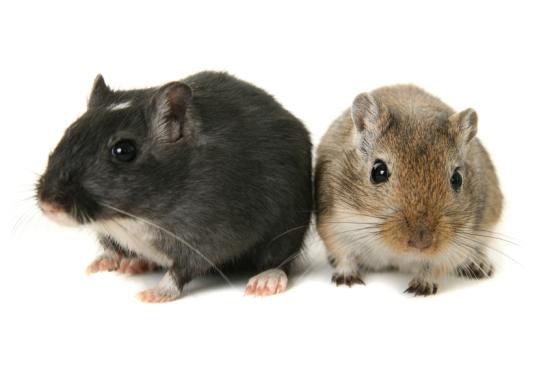Gerbils
The wild gerbil’s habitat is arid and desert. They are adapted to conserve water and are therefore largely odourless. They live in colonies and burrows underground. Gerbils are curious animals and make interesting, lively pets that are fast on their feet. They rarely bite. First discovered in 1954, the Mongolian gerbil rapidly became popular as a pet and is now available in a range of colours. They are social animals that should be kept in small, single sex groups or pairs. Animals for pairs or colonies should be bought at the same time, as it is unlikely that new individuals will be accepted at a later date.
Gerbils can live for 2 to 4 years.
CHOOSING AND BUYING YOUR GERBIL
A healthy gerbil should be:
Bright and alert
Have no signs of discharge from eye, ears, mouth and nose
Have a clean anal area
Have a glossy coat with no bald patches and no have sores on the skin
Should have no signs of breathing problems
Should move around the cage easily
Should feel well covered and not bony
Bright and alert
Have no signs of discharge from eye, ears, mouth and nose
Have a clean anal area
Have a glossy coat with no bald patches and no have sores on the skin
Should have no signs of breathing problems
Should move around the cage easily
Should feel well covered and not bony
HOUSING
Always purchase as big a cage as possible. The size of this will depend upon the number of animals you wish to keep. Some of the larger hamster cages are suitable and your local pet shop will be happy to give you advice. An interesting and welfare friendly way to house gerbils is in what is often known as a gerbilarium. This is usually a large fish tank with a vivarium or mesh lid filled to a depth of 15-20cms with a mixture of peat, shavings and hay. The gerbils will create a network of burrows in much the same way as they would in the wild. This is fun to watch and stimulating for the animals but makes handling difficult. The contents of the gerbilarium will need to be changed every few weeks. Traditional style cages need to have quite a deep layer of shavings and the whole thing will need to be cleaned and disinfected weekly. Gerbils will appreciate a weekly silver sand bath. Gerbils are naturally nervous and must be provided with a house or nest box to feel secure. This should be lined with soft small animal bedding. Cardboard or plastic tubes to run through are much appreciated. Wheels should not be added as gerbils can injure their tails using them. Whatever type of cage or enclosure you choose it should be kept in a quiet part of the house, out of direct sunlight and protect from draughts. A normal room temperature is best; fluctuating or extreme conditions must be
avoided.
avoided.
FEEDING AND WATER
There are many prepared foods that are suitable for gerbils, but those that contain a lot of sunflower seeds should be avoided. It should be offered in a small, heavy bowl and changed daily. Fresh foods like apple, carrot and other hard fruit or vegetables can be given in small quantities. Always remove uneaten fresh food daily. Special gerbil treats are available and it is a good idea to add vitamin drops to the water. Although they are desert animals, fresh clean water should be available at all times in a drinking bottle. Like all rodents, gerbils’ teeth grow continuously, making chew toys essential. Mineral stones, wooden toys, hide chews (sold for dogs) and hard cardboard tubes are all useful for this reason. Food bowls and water bottles should be cleaned each day.
HANDLING
Regular handling will help your gerbils become tame but care and patience may be needed. The easiest way is to scoop them up so that their body is cupped using both hands. Alternatively, you can grasp them gently but firmly over their back with one hand, and the other holding the base of the tail. Never pick up your gerbil by its tail.
General care
Properly cared for gerbils do not normally suffer from ill health. Obesity can be caused by offering too many high fat items like sunflower seeds so these should only be given sparingly. Sore or bleeding noses can be caused by the wrong type of litter, cages and even stress. If you notice any problems, or if your gerbil’s teeth grow too long, you should consult a vet.

Shopping List
- Large cage/ aquarium with Water bottle
- an escape proof lid
- brush
- Shavings (and hay or peat)
- Pet-safe disinfectant
- Ceramic or metal bowl
- Gerbil food
- Soft bedding
- Mineral stone
- Wooden chew toys
- Vitamin drops
- Tubes or other toys
- Book on gerbil care
